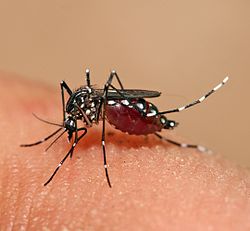26
Feb
Mosquitoes Show Resistance to Highly Toxic DEET Repellent
(Beyond Pesticides, February 26, 2013) The world’s most commonly used synthetic insect repellent is not as effective as it once was, according to scientists at the London School of Hygiene and Tropical Medicine. While researchers found DEET to be an effective repellent after an initial application, subsequent rounds of testing mere hours later showed mosquitoes to be unaffected by its presence. The study, published in the journal PLOS One, underlines the need to develop safe, natural, effective alternative preventions to this hazardous chemical.
To perform their experiment, researchers took the mosquito species Aedes aegypti, a carrier for dengue and yellow fever, and exposed it to a human arm covered in DEET. A few hours later they repeated the experiment, but this time the mosquitoes largely ignored the presence of the chemical. To find out what caused this to occur, researchers placed electrodes on the antennas of the insects. “We were able to record the response of the receptors on the antenna to DEET, and what we found was the mosquitoes were no longer as sensitive to the chemical, so they weren’t picking it up as well,” co-author James Logan, PhD told the BBC. “There is something about being exposed to the chemical that first time that changes their olfactory system – changes their sense of smell – and their ability to smell DEET, which makes it less effective.”
The authors indicate that this current research does not contradict their earlier studies on DEET from 2010. Published in the journal PNAS, the researchers discovered that A. aegypti females were able to pass down a trait which prevented the sensory cell on the insect’s antennae from detecting DEET. When mutated females were bred with males of unknown sensitivity in tests, the quantity of mosquitoes that were insensitive to DEET rose from 13% to 50% in one generation. Dr. Logan told the BBC that, “It was vital to understand both these permanent genetic and temporary olfactory changes that were taking place.”
“Mosquitoes are very good at evolving quickly,” Dr. Logan explains. Companies currently experimenting with genetically engineered (GE) mosquitoes should take note of Dr. Logan’s statement. Environmental groups, such as the UK based Genewatch, are concerned about continued experiments by the biotechnology company Oxitec, which is attempting to develop mosquitoes genetically engineered to produce sterile offspring. The organization claims, citing confidential Oxitec documents, that there is a possibility of next-generation mosquitoes mutating further and surviving until breeding age. This would imply that the modification could only provide a temporary reduction in the number of mosquitoes, with further unknown human and environmental health effects as a result.
Scientists, medical doctors, and environmental groups have raised concerns about DEET for years – and not just because of issues with resistance. DEET is quickly absorbed through the skin and can cause severe skin reactions at high concentrations, including large blisters and burning sensations. A 2009 study found DEET to have the potential to cause neurological damage in humans, as it was shown to interfere with the prominent central nervous system enzyme acetylcholinesterase (AChE). AChE is crucial for regulating nerve impulses in both insects and mammals. Interference with the nerve signaling process can cause convulsions and lead to muscular paralysis. In humans, symptoms of this disruption include headache, exhaustion and mental confusion together with blurred vision, salivation, chest tightness, muscle twitching, and abdominal cramps. The study also investigated the consequences of DEET interactions with carbamate insecticides on the cholinergic system, and found that DEET has the capacity to strengthen the toxicity of carbamates, a class of insecticides also known to block acetylcholinesterase.
DEET’s synergistic toxicity with other pesticides is well documented. A 2001 study showed that a combination of DEET and permethrin, another chemical often sprayed for mosquito control, led to motor defects and memory dysfunction in humans. Although EPA does not test for the synergistic effects of pesticides, one should never combine pesticides with each other or use them with other medications. Even a drug as simple as an antihistamine could interact with DEET and cause toxic side effects.
There are many least-toxic options for repelling insects that include the use of citronella and other essential oils, like oil of lemon eucalyptus, which has been recommended as an efficacious alternative by the Center for Disease Control and Prevention (CDC). For more information on safer methods to protect yourself from insects, please visit Beyond Pesticides’ fact sheet on repellents.
Given last year’s public health crisis as a result of a severe West Nile virus (WNv) outbreak, Beyond Pesticides encourages citizens concerned about the use of pesticides to control mosquitoes to begin attending, or encourage your own, community meetings on alternative strategies to control WNv. Contact Beyond Pesticides with any questions you may have at [email protected] or 202-543-5450.
Source: BBC
Image Source: Wikipedia
All unattributed positions and opinions in this piece are those of Beyond Pesticides.










